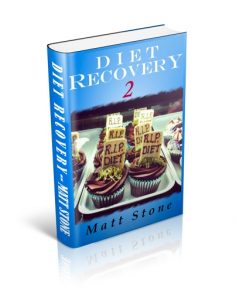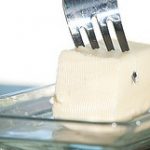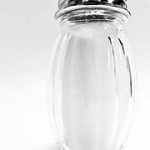I’ve got some news: we’re bringing back weekly Q&A!
I was getting a little overwhelmed with all the questions for a while there, and so I’ve been mostly handing them off to all our Facebook friends to help answer them. Which is great—I love the team effort! But I thought for ones which I really want to give my $0.02 and provide a more in-depth answer myself, I could start answering them as a blog post. That way, they will be easy to refer back to if others ask similar questions in the future, and eventually we’ll have a whole directory of Q’s & A’s for anyone to search through. Sound good? Let’s get started!
Question of the Week
Ciara asks:
“Hi! I really need some advice. I have been taking 2-3 tablespoons of coconut oil a day, eating grass fed butter with my food and drinking whole milk now and I am gaining like a pound or two a day!!!! I am now 25lbs over weight. I got online and it seems this is happening to a lot of people who who switch to a “eat fat to lose fat” diet. Likes it’s just another fad that does not really work…. I had so much hope because it made so much sense. Any advice? Thanks so much.
Ah. The Eat Fat, Lose Fat diet. Lots of people are a fan of this Sally Fallon endorsed weight loss plan, but, I’m not surprised that you’re finding it isn’t miraculously causing your weight to melt right off.
I know there are people who won’t like the fact that I’m saying this, but basically, YES—you are right. The idea that you can eat as much fat as you want and lose weight IS a fad, and it IS flawed.
Why? Because calories still matter.
If you’re eating the same amount of food, doing the same amount of physical activity, and are now adding in 500+ calories from fat every day to it, then you’re at a calorie surplus. Are all calories the same? No. Some are more thermogenic than others. However, the basic premise of energy balance—calories in versus calories out—as the primary factor in body weight management, is biological fact, and I really wish people in the alternative nutrition sphere would quit ignoring this, and stop perpetuating the myth that calories don’t count. They do. Food quality counts too, but calories are energy, and if that energy is not used, it is stored as fat or muscle, depending on your physical activity.
Now, obviously, I am all about the saturated fat. I’m a huge fan of coconut oil, whole milk, and butter (duh). However, I am not an advocate of simply cramming in as much of these healthy fats as possible, at the advice of a health guru. If you truly are craving these very large amounts of fat, then by all means—listen to your body and eat them. But I don’t think it’s wise to eat huge amounts of fat as a weight loss tactic. I believe eating balanced is always best.
Restricting fat is bad. But swinging to the other side of the pendulum, and eating as much fat as you possibly can, creates an imbalance of other nutrients. Eating a balance of fats (making sure most are saturated, while minimizing PUFA), proteins, and carbohydrates is essential in maintaining a healthy metabolism.
If you are gaining weight this rapidly, my guess is that you’ve been dieting for a while, and this is your body’s attempt to build back up some reserves due to depressed metabolic function. Any time you do the restrictive dieting thing, then start eating good amounts of food, weight will pile on pretty quickly. It’s usually more just your glycogen stores and water weight (as opposed to actual fat) that are contributing the the sudden increase on the scale, but, if you’re sustaining a significant caloric surplus—a positive energy balance (calories in, calories out)—then you will gain either fat or muscle tissue depending on your physical activity. On the flip side of that, if you sustain a negative energy balance, you will lose weight. But that will happen a lot more efficiently if you are eating to support a healthy metabolism—balancing your diet between the macronutrients, eating high-quality food, and giving your body the right amount of fuel as caloric energy.
Action Steps
- If you’re looking to lose weight, figure out where your body stands metabolically, first. You can heal your metabolism with simple dietary and lifestyle changes. Take your temperature. Is it low? Start focusing on what you can do to reduce physiological stress—eating an appropriate amount of calories in a balanced diet, getting an appropriate amount of physical activity, and getting (more than) enough sleep are key.
- Find out how many calories you need to consume to support a healthy weight for your body, based on your activity level and other important factors, by going to this site: Total Daily Energy Expenditure.
- As for the coconut oil, I do think you can continue to use it as a tool to aid in weight loss, by boosting the metabolism. I was able to raise my body temperature (and metabolism) significantly just by eating moderate amounts of coconut oil. I don’t think that the recommendation to take coconut oil in Eat Fat, Lose Fat is such a bad idea, but in my opinion, slamming down 2-3 tablespoons every day as a dietary supplement is possibly excessive. Simply switch your cooking fat to coconut oil when you can, and if you want to be consuming more of it, try my tasty coconut oil chocolate or tortilla chips!
- Understand what to expect while rehabilitating your metabolism. You may gain weight, but this is part of the process of healing. Trust that eating the right amount of food to sustain a healthy weight will result in getting you to that healthy weight eventually. You simply cannot continue to gain weight in a caloric deficit—this is basic biology. Science, yo. Be about it.
Recommended Resources
 For you, Ciara, I recommend reading Diet Recovery 2, by my friend and independent health researcher, Matt Stone. This is my go-to recommendation for anyone who has struggled with restrictive dieting, and has tried everything in the book to get to a healthy weight, only to be left with a bunch of health problems and weight that won’t budge no matter what. Diets don’t work. This book teaches you why, and tells you how to fix your metabolism so you can truly recover. Matt also does an excellent job explaining all the health effects of both a healthy and unhealthy metabolism, and what to expect while you go through the process of raising metabolic rate. Very helpful so you won’t have to worry about the temporary changes happening in your body that can be discouraging at first.
For you, Ciara, I recommend reading Diet Recovery 2, by my friend and independent health researcher, Matt Stone. This is my go-to recommendation for anyone who has struggled with restrictive dieting, and has tried everything in the book to get to a healthy weight, only to be left with a bunch of health problems and weight that won’t budge no matter what. Diets don’t work. This book teaches you why, and tells you how to fix your metabolism so you can truly recover. Matt also does an excellent job explaining all the health effects of both a healthy and unhealthy metabolism, and what to expect while you go through the process of raising metabolic rate. Very helpful so you won’t have to worry about the temporary changes happening in your body that can be discouraging at first.
 Another resource I highly recommend is The Nourished Metabolism, by my friend Elizabeth Walling. This book approaches the topic of metabolic health from more of a holistic and whole-foods-minded perspective, which many of our readers appreciate. It is also much more straightforward—a simple how-to guide that lays out all the steps you need to take to get your metabolism where it needs to be. It is a perfect companion to Diet Recovery 2
Another resource I highly recommend is The Nourished Metabolism, by my friend Elizabeth Walling. This book approaches the topic of metabolic health from more of a holistic and whole-foods-minded perspective, which many of our readers appreciate. It is also much more straightforward—a simple how-to guide that lays out all the steps you need to take to get your metabolism where it needs to be. It is a perfect companion to Diet Recovery 2
Finally, this next book is an absolute must-read. Taking Up Space, by my friend Amber Rogers, of Go Kaleo fame, is the clearest, most concise yet amazingly informative guide out there for managing a healthy weight. The byline is: “A Guide to Escaping the Dietary Maze,” which I think is so fitting. It’s so confusing, all the conflicting information out there, but what Amber presents is a simple, scientifically-based solution to meet your health and weight goals. Amber doesn’t give you a bunch of rules for what you should eat and exactly how you should work out—she makes it simple, flexible, and easy to determine your own unique dietary and activity needs. Definitely get this book. And go like the Go Kaleo Facebook page, like now.
Taking Up Space is available on Amazon Kindle, which you can still read even if you don’t have a Kindle with the Kindle Reading Apps.
UPDATE: Right now, Taking Up Space is only $2.99! I don’t know how long it will be available at this price, so get it now for less than 3 bucks while you can!
[easyazon-block align=”none” asin=”B00C9VC9OI” locale=”us”]
Got a Question?
Send me a Facebook message, email, or comment below. I try to get to as many questions as I can, but it can take a while to sort through all of them. Thanks for your patience!





So, assuming everything else with your body is in proper working order, and to loose weight you have to eat less, does it mean you stay hungry? Or will the hunger factor solve itself once you start paying attention to when you feel full?
Yes and no. What you need is a negative energy balance—so instead of cutting calories, you can increase your energy expenditure. Strength training is an excellent way to accomplish this.
But yes, it’s still important to develop intuitive eating skills—as you said, to start paying attention to when you feel full. That’s not always as easy as it sounds. I recommend reading Intuitive Eating for more on that. Many of us have eating habits that cause us to eat when we are not actually hungry—so the skills of both recognizing hunger and fullness signals need to be developed.
Doesn’t everyone get more hungry when they exercise? I’m a skinny girl, when I started cycling in the mornings (15-20 minutes) my appetite pretty much doubled.
Then again, my husband, who is trying to loose weight, starting running, and he started eating more yoghurt in the mornings (right after the exercise), but otherwise his appetite seems to be the same.
That book looks interesting, thanks Emily! Psychology behind eating is fascinating.
Thank you for being brave enough to say that even in the health food realm, where we scoff at the fad diet culture, we still have our own fads. I won’t mention them specifically because I’m not in the mood to get blasted in your comments section 😉 but my goodness, there are some serious fads going on, especially with certain diets that are appropriate for people with specific health conditions: that doesn’t mean the rest of us need to follow those same diets and criticize those who don’t! In a few years, someone else will come out with a new book, and many of the trendy diets of today will be long forgotten in favor of some new ingredient that we’re all supposed to shun.
Could not agree more. One of Matt Stone’s most quoteable quotes: “Fat causes disease? Carbs? What next, air?”
A-freaking-men!
What about Trim Healthy Mama concept? I ignore the parts of that eating plan that I don’t consider “real food”. But the concept of eating satisfying meals with lots of fat, and almost no carbs, and alternating with energizing meals with more healthy carbs and very little fat? It makes sense to me!
I am always fascinated that in every extreme, people always come back to the same conclusion. Moderation in all things. We can not get away from this. Our bodies need homeostasis and can only have this when we avoid extremes. All fat will not work. All carbs will not work. All protein will not work. We need all of them, everything nature has provided.. and a lot less of the manmade junk! Balance, balance, balance.
The thing I dont get is why you suggest alot of saturated fat, a nutritionist with 20 years of experience told me saturated fat is responsible of high cholesterol levels. Also every research I’ve done is telling me the same thing, I’m really confused now
20 years ago, that was the common thinking, but if you dig a little deeper in your research, you’ll find that many studies have shown that that correlation is incorrect. Also, what we now call “trans” fats, or hydrogenated or partially hydrogenated oils, were lumped in with natural sources of saturated fats back in the day, which totally skewed studies. I’m on a tablet right now, so I can’t provide you links, but I’m sure someone will. Saturated fats from natural sources are delicious and great for you.
I know coconut oil is healthy though, but doesnt too much can clog your arteries? Even my biology teacher told us! But polyunsaturated fat has health benefits in moderation so I’ll go with moderation for both!
Are you outta your mind? How does coconut clog your arteries? Honestly, how? Saturated fats? Hardly. http://youtu.be/v8WA5wcaHp4 this is a snippet from fat head, I use this mostly because they explain it better, this isn’t the part i was looking for specifically, but you can find in there where it describes how your arteries clog and why. Guess what hurts your arteries. . . POLY UNSATURATED FATS, why? because the cause inflammation which is the root cause of clogging arteries.
Eating more fat with an expectation that the body would start adjusting to the newly acquired eating habit by replacing the old one that I have been following since childhood is not possible all of a sudden. When I add more fat to my regular diet, my body would identify it as extra fat and start storing it in my body leading to increase in my body weight. “Eat fat lose fat” is a fad with a steep graph which gains attention as fast as it looses it. It is very important to remember that if I want to remain fit and healthy I need to eat healthy, think positive and most importantly exercise regularly. Even a machine wears off if its not oiled and operated regularly. Human body too is similar. I just need to know that my final objective is to loose some weight and stay healthy and then work on achieving it.
I tried to sign up for your blog but never received the email to confirm…I did this twice.
THANK YOU for this post! I gained nearly 30
Pounds downing fat like there was no tomorrow. My body is still trying to recover back to normal size 🙁
You know, sometimes im like, yeah youve got the right idea and then you put out something like this. Maybe your just giving us a snippet of this persons question, But I see no reason to believe that she is consuming more calories by adding some things into her diet. As far as I see there is a lot of assumptions going on. Also I have never seen the calories in calories out equation work out. It seems entirely inaccurate to the point of being absurd most of the time. Also, is she drinking raw milk or grass fed milk, it doesn’t say, but from all the info I have gathered you should limit milk consumption when your trying to lose weight. Partially in the fact that lactose raises your blood sugar quite readily. Quite honestly its kinda rude to call eat fat to lose fat a fad when it does work for more people that calorie and fat restriction. Either the person who asked or yourself have not given enough information for any proper conclusion.
Stop eating grains, especially wheat, and corn. Stop eating refined sugar! You can eat all the good fats you want but the body will still use sugar first. Wheat and starches are packed sugars. Check the glycemic index of potatoes! It is higher than table sugar.
FTR, I do not recommend following this advice. The glycemic index is a joke.
I find it amazing that so called experts still beleave in the calorie in calorie out when they have absolutely nothing to do with weight loss/gain unless you are a steam engine . The human body is far more complicated .
I politely suggest that you should up your studies on this and look up with particular regards to the metabolic pathways of different foods and the GI tables .
Calories have “absolutely nothing to do with weight?” Care to provide any evidence for that statement?
Hi,
What is your opinion on juicing (80% veg and 20% fruit)? about 1300 calories.
Juice fast 3-7 days?
Longer 100 juicing up to 60 days?
How dangerous?
I did 5-7 days twice and felt wonderful: light, happy, not hungry nor obsessed with food. I do worry if this negatively affects the way the stomach handles food in the future. There is enough calories, but no fat, possibly lower protein.
I felt extremely difficult to do this on winter felt very cold all the time.
Overhydration?
I have bad stomach issues with normal balanced diet. As far as I could figure I am sensitive to hard fiber and balanced diet makes me feel my stomach is about to explode! from the afternoon hours. Had no issues with low carb, only I don’t believe it’s healthy…Was hoping intermittent juicing fasts can get me to the good weight point and help to maintain (with addition of veg., fish, chicken and nuts meal). I love your approach and I hope you can give me an advice.
Many thanks in advance.
x
Nataly
Are you saying that this weight gain is happening while following the restricted calorie, no sugar, no nuts, weight loss guidelines in Eat Fat Lose Fat?
I have been using coconut oil, using butter, and eating vegetables, fruits, nuts and seeds, along with grass fed beef, organic eggs, potatoes, and other things, and I have lost weight.
I weighed 330 lbs when I started. Began drinking 8 glasses of water a day, stopped coffee, tea, sodas and other things, and started walking twice a day.
I had a car accident and am unable to walk very far now….but I am continuing on my program.
One lady said she gained weight, but she was underweight…
Dr. B. said that we should be eating 80% fruits and vegetables and 20% protein.
It is recommended in his book to walk at least one hour in the morning and one hour in the evening. WHen we walk one hour, we set off a hormone in the body that burns fat for 12 hours. Walking twice a day, causes the hormone to burn fat for 24 hours a day.
This is the program I am following. I am down to 250 lbs.
Are you walking? Are you getting adequate rest? Are you stressed out at home? If you eat potatoes, do you leave the skin on? (THe skin makes them alkaline to the body.)
Are you avoiding sugar? Have you cut out most fast food? (I know it is extremely hard to do.)
Our body does require sugar…around 6 teaspoons a day for women, and 9 for men. However fast food is laden with tons of sugar. So one coke will give a person 9 teaspoons of sugar. People cannot normally drink one coke….so throughout the course of one day, they may drink 3 or more cokes…..at 9 teaspoons of suger each time. No wonder they are gaining weight.
I hope that this helps you to tweak your diet. The coconut oil is good for us. One man I know takes 9 tablespoons a day, and he is skinny.
Best wishes and may you determine what is going on in your program. I read Dr. B’s book “you’re not sick, you’re thirsty, and that is the program I follow.
Hope you get to doing better.
Jp